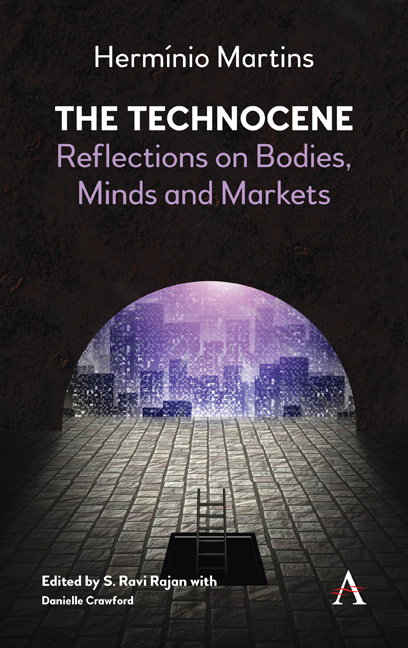Book contents
- Frontmatter
- Dedication
- Contents
- Preface
- Editor's Introduction: Hermínio Martins and the Technocene
- Chapter One The Technocene: On Bodies, Minds and Markets
- Chapter Two Technology Sublime: Paths to the Post-Human
- Chapter Three Perpetual Augmentation: From Eugenics to Human Genetic Capitalism
- Chapter Four The Body Vanishes! Momenta of Discarnation in Technoscience Today
- Chapter Five When Universities Become Body-Shops
- References
- Index
Chapter One - The Technocene: On Bodies, Minds and Markets
Published online by Cambridge University Press: 12 February 2019
- Frontmatter
- Dedication
- Contents
- Preface
- Editor's Introduction: Hermínio Martins and the Technocene
- Chapter One The Technocene: On Bodies, Minds and Markets
- Chapter Two Technology Sublime: Paths to the Post-Human
- Chapter Three Perpetual Augmentation: From Eugenics to Human Genetic Capitalism
- Chapter Four The Body Vanishes! Momenta of Discarnation in Technoscience Today
- Chapter Five When Universities Become Body-Shops
- References
- Index
Summary
Introduction
Our geological epoch since the 1750s, with the large-scale increase in the use of fossil fuels and thus CO2 emissions into the atmosphere, has been called the Anthropocene by some scientists, including the Nobel Prize winner for chemistry, Paul Crutzen. It could also be called the Technocene, inasmuch as the reasons for that denomination, which are because of the impact on the atmosphere of carbon dioxide emissions since the mideighteenth century, have more to do proximately with technological agency than with the psychophysiological make-up of Homo sapiens sapiens. Besides, while it is not clear whether Homo sapiens will survive, there is far more confidence in some circles that technology, in post-human vehicles, will outlive us. Thus, the Anthropocene (in the sense defined) may well represent simply a subset of the Technocene, overlapping for perhaps three centuries or so.
What does it mean to talk about technological agency? Our starting point is the idea that during the past three to four decades, the life trajectories of our species have been transformed by the concurrent, and often interdependent, mutually supportive technification and marketization of crucial phases of our life trajectories, and of most of the key dimensions of what it is to be human. The purpose of this chapter is to examine these interactions between technologies and markets and, in doing so, characterize the Technocene. The chapter has two substantial parts. The first describes the great transconfigurations underway as regards the physical body. The second is an examination of the changes in the social institutions that educate, employ, control, regulate and order our lives.
The Body
Birth
We will be born, with ever-increasing frequency, in a hospital or clinic run as a firm (if not in an ambulance of a private enterprise). The medicalization and hospitalization of childbirth has been pretty-well achieved completely, despite fluctuations according to movements of opinion over the last decades, and even longer. Even before birth, we will owe a lot to firms that may deal with our conception in the cases of in vitro fertilization (IVF) – in general under medical control – of uterine insemination and of gestation.
- Type
- Chapter
- Information
- The TechnoceneThe Technocene Reflections on Bodies, Minds and Markets, pp. 1 - 50Publisher: Anthem PressPrint publication year: 2018



